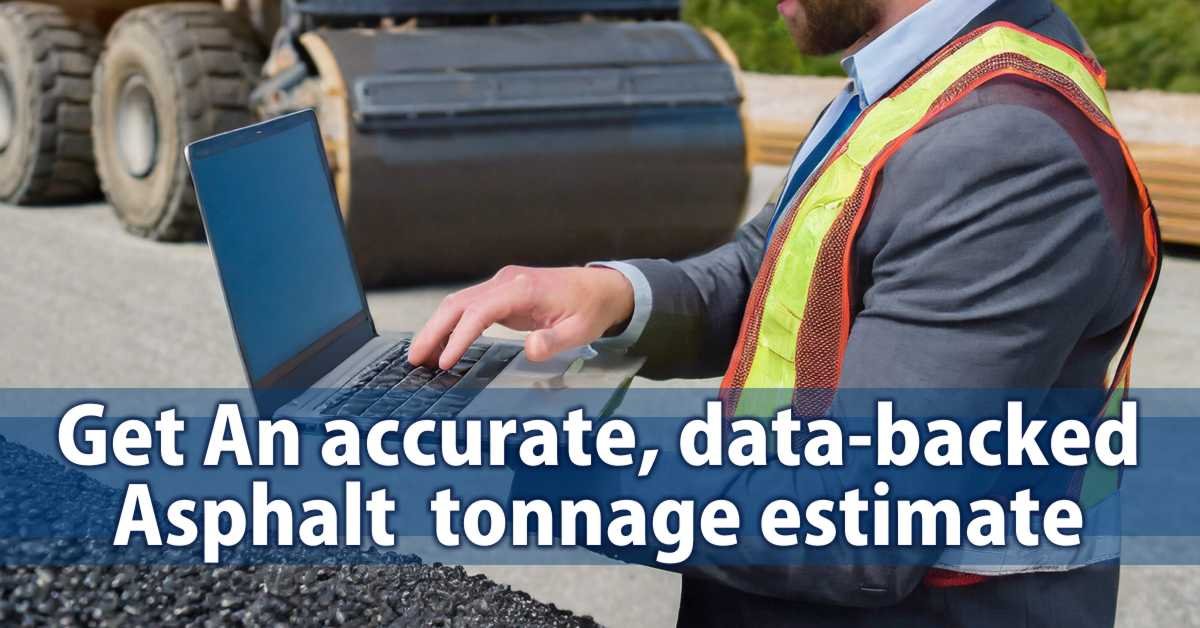Asphalt Tonnage Calculator
No more guessing how many tons of asphalt you’ll need for your paving project. Our new Asphalt Tonnage Calculator provides instant results based on your unique job specifications.

Simply enter the area to be paved along with the specified thickness, and the calculator determines the tons required. It even adjusts for standard compaction rates to make sure you order the right amount.
No lengthy manual computations are needed. In just seconds, you have reliable asphalt tonnage numbers tailored to your project.
Why Tonnage Accuracy Matters
Ordering too little asphalt during construction leads to project delays and extra delivery fees. But requesting too much gets costly too.
Excess asphalt quickly cools in trucks during delays, becoming unworkable and useless. And disposal fees for leftover material mean wasted dollars.
Getting your asphalt quantity dialed in is crucial for an efficient, cost-effective paving job. Our calculator makes it easy.
The Smarter Way to Estimate
Typically, contractors figure out required tons by hand using general industry assumptions that can miss key details.
Our Asphalt Tonnage Calculator uses precision inputs like exact area measurements from design plans rather than estimates. It also adjusts for specialized mix types and designs if specified.
The result? An accurate, data-backed tonnage estimate you can feel confident about for bidding and ordering.

What are some good uses for recycled asphalt pavement (RAP)?
Milled asphalt millings make an excellent recycled material for pavement base layers, driveways, walkways, parking areas, and more. Their angular shape provides great stability.
How can I optimize the structure of an asphalt pavement?
Consider factors like traffic volume, subgrade strength, climate, and costs when determining appropriate thicknesses of asphalt layers and underlying base course materials using mechanics-based structural design methods.
How are asphalt base and wearing courses different?
The base course provides structural strength and load distribution, while the thinner wearing course on top seals and waterproofs the pavement while enhancing friction and ride quality.
Can standard wheel loaders use road widener attachments?
Yes, road width paver attachments like the RW-1935 can mount many medium-sized wheel loaders for cost-effective asphalt road widening rather than needing a larger roadtec paver.
How can I calculate the tons of asphalt needed for my project?
Our asphalt tonnage calculator makes it easy to determine the estimated tons of asphalt required based on the project area and thickness of the asphalt layer. Simply enter your measurements to get the tons needed to be adjusted for standard compaction rates.
What causes crocodile cracking in asphalt pavement?
Crocodile cracking, also known as alligator cracking, happens when repeated traffic loads cause fatigue failure in the asphalt surface. This distress typically starts as longitudinal cracks that later interconnect.
What is the purpose of road shoulders?
Road shoulders serve multiple functions providing structural support, allowing water to drain away from the pavement, improving safety by giving errant vehicles recovery room, and more.
What OSHA rules apply to asphalt workers?
Due to the hazardous nature of working with hot asphalt and heavy equipment, paving crews must follow strict OSHA safety requirements related to things like work zones, high visibility clothing, noise exposure, and fall protection.
How can I remove car oil stains from my asphalt driveway?
As a professional civil engineer, I recommend using an oil stain remover made for asphalt, kitty litter to absorb oil, or degreasers like dawn dish soap and warm water to help get car oil out of asphalt. Avoid harsh chemicals that could damage the pavement.
Are vehicles less fuel-efficient on asphalt roads?
Quality-built asphalt roads provide an exceptionally smooth, safe driving surface. Research shows that the rigidity and smoothness of asphalt pavements like Superpave mixes can improve fuel efficiency compared to rough concrete roads.
What should I look for in a high-quality asphalt sealer?
When selecting a paver sealer, I recommend choosing an acrylic-based sealer containing sand for better durability compared to cheaper water-based sealers. Make sure it offers UV protection and water resistance.
How long does fresh asphalt take to dry and cure?
In ideal weather, new asphalt can take 6-12 hours to dry to the touch. However, it continues to cure and gain strength over the next 18-24 months before reaching its ultimate strength and stiffness.
What is the benefit of using luxury or architectural shingles?
Upgrading to premium luxury asphalt shingles offers greater durability, enhanced aesthetics with unique designs/colors, and dimensional thickness that can mimic wood shakes or slate. The extra investment is worthwhile to boost curb appeal and protect roofs long-term.
How does aggregate gradation impact HMA performance?
Optimizing the aggregate gradation to achieve dense particle packing is crucial for long-lasting pavements. The combined gradation including reclaimed asphalt pavement should meet target density, voids, stability, permeability and workability requirements.
How much asphalt pavement is needed for a project?
Our asphalt calculator tools here on CalculatorAsphalt.com make it easy to estimate tons, costs and materials required for your unique paving project based on measurements of the area to be paved along with specified depth.
Why is temperature important when working with asphalt?
Getting the right HMA temperature during transport, lay down, and compaction is crucial to achieve workability for efficient paving operations while also meeting density specifications for optimal pavement performance.
What extra features does the calculator include?
For ease of use, our tool incorporates adjustments for mix type, potential wasted material, truck load sizes, and other key variables that impact total tons required.
How do I input irregular areas?
You can enter dimensions for multiple shapes like rectangles, circles, and triangles to calculate tonnages for irregular areas like cul-de-sacs.
You can use our free area volume asphalt calculator tool
Who do I contact for assistance?
If you have any issues running calculations or questions on appropriate inputs, click the “Ask an Expert” link for on-demand support from our team.
We hope you find this Asphalt Tonnage Calculator to be a valuable paving resource!
